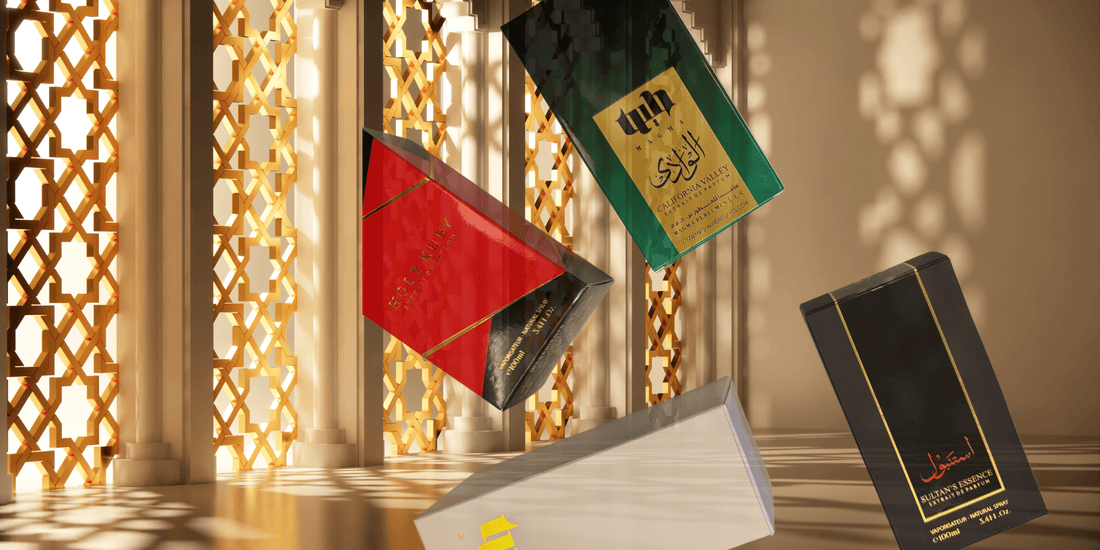
The Significance of Perfume in Islam and Magma Perfumes
Share
Perfume holds a special place in Islamic tradition, not only as a means of personal hygiene but also as an expression of spirituality and reverence. Throughout Islamic history, fragrances have been associated with cleanliness, prayer, and the prophetic traditions of Prophet Muhammad (peace be upon him). At Magma Perfumes, we honor this rich heritage by offering luxurious, long-lasting fragrances inspired by the finest Islamic scents. This blog explores the deep-rooted significance of perfume in Islam, its role in religious practices, and the types of scents cherished by Muslims.
Perfume in the Sunnah
The use of perfume is strongly encouraged in Islam, as it was a beloved practice of Prophet Muhammad (PBUH). Numerous hadiths highlight his fondness for pleasant scents and his encouragement for both men and women to use perfume, particularly on Fridays and special occasions.
The Prophet (PBUH) said:
"Among the things of your world that have been made dear to me are women and perfume, and the coolness of my eyes is in prayer." (An-Nasa’i 3940)
This statement reflects the importance of fragrance in daily life, emphasizing its role in enhancing one’s personal well-being and spiritual connection. Magma Perfumes embraces this tradition by crafting high-quality perfumes that align with Islamic principles.
Perfume and Purity (Taharah)
Islam places great importance on cleanliness (taharah), and wearing perfume complements this principle. Good hygiene, including the use of pleasant scents, is essential, especially before prayer. It is encouraged for Muslims to apply perfume when attending the mosque, as bad odors are discouraged in places of worship.
The Prophet (PBUH) advised:
"Whoever takes a bath on Friday, puts on his best clothes, applies some perfume if he has any, then attends the Jumu’ah prayer without stepping over people’s necks, then prays what is prescribed for him and remains silent while the Imam is delivering the sermon, his sins between that Friday and the next will be forgiven." (Ibn Majah 1097)
This hadith underscores the significance of perfume in preparing oneself for prayer and purification. Magma Perfumes’ long-lasting fragrances ensure you stay fresh and spiritually uplifted throughout the day.
The Use of Oud, Musk, and Other Fragrances
Certain natural fragrances are highly esteemed in Islamic tradition, especially oud and musk. These scents were frequently used by the Prophet (PBUH) and have remained popular among Muslims worldwide.
-
Oud (Agarwood) – A rare and valuable resinous wood used in attars and incense. The Prophet (PBUH) recommended its use for purification and fumigation.
-
Musk – A rich, warm scent considered one of the best perfumes. It was used by the Prophet (PBUH) and is mentioned in hadith as a fragrance of paradise.
-
Rose, Amber, and Sandalwood – These are also widely used in Islamic traditions, particularly in non-alcoholic attars and incense.
At Magma Perfumes, we incorporate these sacred ingredients into our signature fragrances, ensuring an authentic and spiritually enriching experience.
Perfume and Spirituality
Perfume is not only about physical appeal but also about enhancing spiritual experiences. Many scholars mention that pleasant scents uplift the soul and create an atmosphere of peace and serenity, which aids in devotion and worship.
Additionally, in Islamic eschatology, the concept of fragrance is tied to the afterlife. Jannah (Paradise) is described as having an exquisite aroma, and the righteous are often associated with beautiful scents, while foul odors are metaphorically linked to sin and corruption.
By choosing Magma Perfumes, you are not only embracing luxury but also connecting with the spiritual essence of traditional Islamic fragrances.
Islamic Guidelines for Wearing Perfume
While perfume is encouraged, Islam provides certain guidelines for its use:
-
For Men: Wearing perfume is highly recommended, especially before attending prayers, gatherings, and social interactions.
-
For Women: Women are permitted to use perfume in private settings, but when in public, they are advised to avoid strong scents that may attract unnecessary attention, as indicated in various hadiths.
Conclusion
Perfume in Islam is more than just a fragrance; it is an embodiment of cleanliness, spirituality, and the Sunnah of the Prophet (PBUH). The use of scents like oud, musk, and rose remains deeply rooted in Islamic culture, serving as a reminder of both physical and spiritual purification. Magma Perfumes continues this tradition by crafting luxurious, perfumes that enhance personal well-being and faith.
Discover the essence of spirituality and sophistication with Magma Perfumes—where timeless Islamic traditions meet modern elegance.